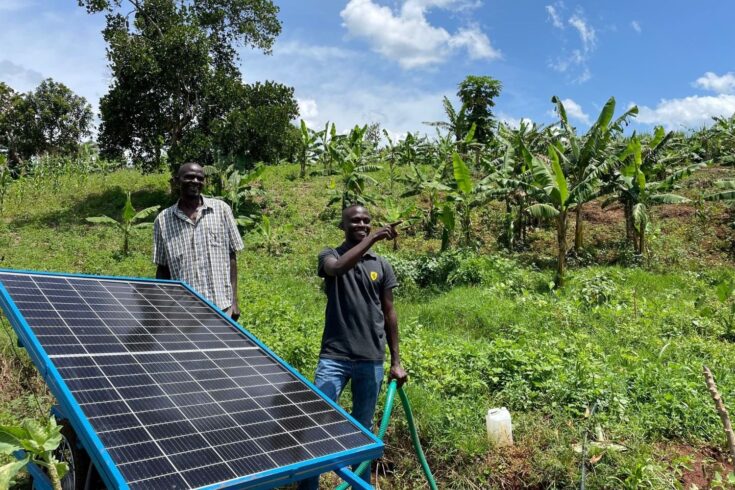I visited Uganda in late spring, a few weeks after the rainy season had started. The vegetation was lush with agricultural abundance and market stalls were brimming with bananas, pineapples and passion fruit. But it is not always like this. The rain started late this year, the soil had been dry, and the harvest delayed.
Reliable water supplies
Even in the dry season there is usually enough water in the rivers, swamps and boreholes for irrigation.
The problem for small rural farmers is getting the water from these sources to their crops. The prize is that if farmers can get the water to their short season crops like tomatoes, they can be harvested multiple times throughout the year.
Aptech off-grid system
Up steps Paul Kamoga at Aptech, an Energy Catalyst funded company based in Uganda who are developing an off-grid water pumping system.
We took a three-hour journey to visit one of their systems in a remote community near Jinja. The system of components they provide are well tested and robust, including:
- a high spec, rugged 340 watts photovoltaic (PV) panel
- an award-winning pump
- 200 meters of flexible pipe and sprinklers.
The innovation is in the different business models they are trialling to help ensure this is an affordable, scalable solution for small farmers.
Smart Villages Research Institute
To develop the business models, Aptech are working in partnership with UK-based Smart Villages Research Institute (SVRI). SVRI specialise in understanding the local context and then working with local partners like Aptech to provide appropriate solutions.
From the collaboration they are trialling three different payment mechanisms:
- upfront payment
- pay to pump, known as ‘pay-n-pump’
- lease to own.

Paul Kamoga, Aptech Africa (credit: Ian Meikle, Innovate UK)
Increasing yield with pay-n-pump
At 10 million Ugandan shillings (a little over £2,000) for the upfront option this is proving too much for rural farmers. The assumption was that farmers may prefer the lease-to-buy option. However, due to the seasonal nature of farming they have generally been unwilling to commit to regular monthly payments.
By far the most popular option has been ‘pay-n-pump’, where farmers only pay for the water they use. For instance, in the rainy season, the water does not need pumping, and at other times they may not have crops in the ground.
So far, Aptech have installed 68 solutions, with farmers on average more than doubling their yields, which as well as paying the ‘pay-n-pump’ costs, has also increased their income.
Local support network
There are lower price competitors in the marketplace, but PV panels can be counterfeit and system quality and servicing can be poor or non-existent. This is where their local agents are invaluable, to advocate for the quality of the system.
Nkaire Emmanuel is chair of the local region (regional administrator). He has successfully installed a system on his own farm and provides qualified leads to Aptech for a fee. Part of the success of the programme is due to this network of chair men and women.

Paul Kamoga, Aptech Africa and Limonada Afedraru, The Daily Monitor (credit: Ian Meikle, Innovate UK)
Information and knowledge are key
With a lack of knowledge and misinformation in the marketplace about the most appropriate technologies to use, the press is important too.
Journalist, Limonada Afedraru joined us for the trip to report for her readership in the national newspaper, The Daily Monitor. She specialises in science-based feature length articles on a wide range of agricultural topics; critical for a country with around 72% of the workforce engaged in agriculture (World Bank, 2019). Her article, Farmers take to solar irrigation for higher yields, provides local context.
With this and other Energy Catalyst project visits in Uganda it became clear that the technology must be robust and dependable.
Understanding local issues
However, equally important is a strong understanding of the local situation, sustainable business models and methods of scaling the solution. This is where a collaboration between SVRI and Aptech really pays dividends.
The goal is a more widespread take up of reliable solar water pumping solutions to increasing rural farmers’ incomes, and to create scalable, investible local businesses like Aptech.
In turn, this fits with the Energy Catalyst’s goal of creating technologies and business models to help meet the United Nations (UN) sustainable development goal (SDG7) of ‘affordable and clean energy’.
Trips like this, to meet local leaders and understand local contexts are critical to feedback into the scope and design of future funding. Hopefully, through communicating success stories like this, you have been inspired to partner internationally in support of the global clean energy agenda.
If this has inspired you
If this has inspired you, round nine of Energy Catalyst funding is open for applications until 10 August 2022. Further details:
- Energy Catalyst round nine: early stage
- Energy Catalyst round nine: mid stage
- Energy Catalyst round nine: late stage
The Energy Catalyst programme is aligned with the UN SDG7, providing affordable and clean energy.
Further information
Connect with Ian on LinkedIn
Find out more about the Energy Catalyst
Connect with the Energy Catalyst on LinkedIn
View the Energy Catalyst videos on our YouTube playlist
Follow Innovate UK on Twitter
Connect with Innovate UK on LinkedIn
Follow Innovate UK on Facebook
You can go to the new Innovate UK website
You can go to the Innovate UK EDGE website
Subscribe to our YouTube channel
Sign up for our email newsletter
Top image: Credit: Ian Meikle, Innovate UK




